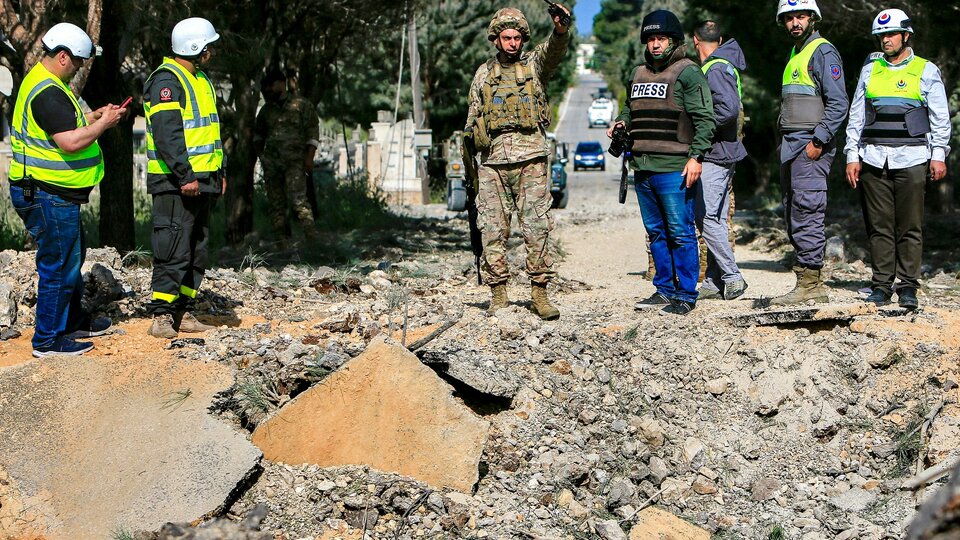
Israel and Iran exchanged threats This Tuesday, Tehran raised fears of an escalation in the Middle East after it launched an offensive against its adversary on Saturday. In this context, The Israeli military said a Hezbollah brigade commander and another missile specialist were killed. During a separate bombing campaign against southern Lebanon. The Lebanese Shia group is an ally of Tehran.
The first strike, against a vehicle in the Ain Bal area, killed a Hezbollah member identified as Ismail Youssef Bass, who served as commander of the group's coastal sector and “served in various positions in the military wing” of the militia. According to a statement from the Israeli military.
“As part of his position, Ismail participated in the promotion and planning of the launch of rockets and anti-tank missiles from the Lebanese coast towards Israel,” the military memo said, without providing relevant evidence.
On the other hand, its warplanes bombed the Lebanese region of Kafr Dunin this Tuesday, where the Israeli government says the commander of the rocket and missile division of Hezbollah's elite Radwan forces was killed.
According to another Israeli military report, the high command, identified as Muhammad Hussein Mustafa Shihuri, was in charge of that sector in central and western Lebanon, from where he planned several missile launches against the Jewish state.
In the same bombardment, another militant from the faction, Mahmoud Ibrahim Fadlallah, also died, according to his version.
For its part, Hezbollah announced the death of three members with the same names, but did not provide details of the circumstances under which they occurred, nor did he confirm that two high-ranking officials were among them.
The Lebanese National News Agency (ANN) reported two vehicle bombings in the area adjacent to Ain Baal and Kafr Dounine, explaining that both caused deaths and injuries. Hezbollah responded to both operations by attacking an air reconnaissance base and headquarters in northern Israel.
The parties continue the crossfire that began half a year ago. Amid growing tensions in the Middle East, Iran launched more than 300 drones and missiles at Israeli territory over the weekend, with no deaths reported.
The world's expectation of an immediate response from Israel, which seems inevitable, is growing. “We cannot remain idle in the face of such aggression and Iran will not be hurt,” Israeli military spokesman Daniel Hagari said the day after his country's military chief vowed to “respond” to Iranian aggression.
“Firing 110 missiles directly at Israel will not go unpunished. We will respond at the time, place and manner we decide,” he added.
Iranian President Ibrahim Raisi also reiterated that his country would respond “severely”. Israel's “small action” against “Iran's interests”.
The two leaders made the statements despite calls for restraint from the international community, which fears escalating tensions in the region, where Israel has been fighting the Palestinian Islamist movement Hamas for more than six months in the Gaza Strip.
Iran launched an unprecedented attack against Israeli territory on Saturday night in retaliation for the bombing that destroyed its embassy in Damascus on April 1. An attack in the Syrian capital killed seven Revolutionary Guards and blamed Israel.
Israeli officials said all of the more than 300 missiles and drones launched by Tehran were intercepted with the help of the United States and other allies.
A “diplomatic offensive
Deciding how to respond, Israel announced on Tuesday that it would launch a “diplomatic offensive” against Iran and called on 32 countries to impose sanctions against Iran's Revolutionary Guard and its missile program.
US Treasury Secretary Janet Yellen vowed that Washington would “not hesitate” to intensify sanctions against Tehran and EU diplomacy chief Joseph Borrell announced he would consider expanding them.
Israeli Prime Minister Benjamin Netanyahu on Monday urged the international community to “stand united” in the face of Iran's aggression.
But leaders of major international powers are sounding a note of caution. US President Joe Biden has indicated that while Washington offers unwavering support to Israel, it will not engage in retaliation.
Russian President Vladimir Putin warned his Iranian ally that escalation in the Middle East would have “disastrous consequences for the entire region,” the Kremlin said.
For Turkish President Recep Tayyip Erdogan, the Iranian attack was the fault of Netanyahu and his “bloody administration”.
And British Prime Minister Rishi Sunak urged Netanyahu to act “in cold blood” following the latest attack. “A significant escalation would not be in anyone's interest and would deepen insecurity in the Middle East,” he stressed.

“Introvert. Thinker. Problem solver. Evil beer specialist. Prone to fits of apathy. Social media expert. Award-winning food fanatic.”





More Stories
Two influencers drown after refusing to wear life jackets: “ruining selfies”
Uruguay 2024 election results: who won and when is the second round | Waiting to know whether there will be a runoff or not
Uruguay: Lacalle Pou leaves with his figure on the slopes | The Marcet and Asteziano scandals hit the right-wing ruler